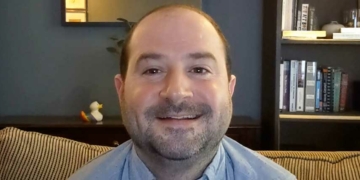Academic Kathleen Stock asks what has gone wrong with LGBT staff networks in workplaces?
If yours is a large employer, chances are there’s a staff LGBT network, group, or forum at your workplace. Here’s a question: what do you think it’s for? When I came out, relatively late and with few sources of support in place, I assumed the one at my workplace would be somewhere I could interact with colleagues facing similar challenges, have a laugh, and feel a sense of solidarity. Admittedly – being a diehard introvert – I didn’t actually pluck up courage to go to any of the pub socials I would see advertised on their Facebook page. But still, I enjoyed feeling part of a friendly virtual community, at least in my head.
It makes sense that LGBT people might be looking for extra support at work. Being gay, bi, or trans puts you in a sometimes uncomfortable social minority. On its website, Stonewall describes the benefits of “providing a space for LGBT employees to support each other, express concerns they may have, and spend time around people who understand their experiences”. These days though, it’s increasingly common for some LGBT people to find they are unwelcome within LGBT workplace groups. Instead of functioning as open, non-partisan spaces for people who broadly share a social identity, in practice many such groups have become hostile and judgemental environments where only those with the “right” politics – and in particular, the “right” views about gender identity – are accepted.
Instead of functioning as open, non-partisan spaces for people who broadly share a social identity, in practice many such groups have become hostile and judgemental environments where only those with the “right” politics – and in particular, the “right” views about gender identity – are accepted.
My own experience of this occurred in 2019, when I authored a letter to the Sunday Times, co-signed by around 30 other academics, protesting what we saw as UK Universities’ overly cosy relationship with Stonewall. I argued that this relationship is a threat to academic freedom; and moreover that academics now face an intimidating atmosphere for expressing concerns about trends such as the badging of males as “lesbians”, and an “affirmation-only” therapeutic approach to trans-identified children. (These are concerns I share with some trans people.) I wouldn’t have dreamt of publicising this letter within the staff LGBT network – I knew it would be needlessly polarising to do so. So I was shocked when, a few days later, I saw the network chair posting on the group’s Facebook page, asking for signatories for a petition on which she said she had consulted. As letter author, it accused me of using “manipulative language”, and of promoting “conspiracy theories” “under a false claim of victimhood”. Feeling pretty isolated, I left the group immediately.
Others I’ve talked to agree that in LGBT staff networks these days, there’s little room for reasonable disagreement about sex and gender identity, let alone constructive dialogue – a situation that’s particularly odd, considering these are issues affecting gay and trans people directly (whatever stance you take on them). Professor Jo Phoenix, an academic at the Open University with a long track record of lesbian activism, described to me a recent attempt to engage in dialogue with the LGBT group at her workplace. This group had distributed a newsletter which contained, in Jo’s words, a “politically contentious” comparison between the Bell versus Tavistock case (the recent legal decision that trans-identified children are unlikely to be able to consent to puberty blocking drugs) and “ex-president Trump’s attempt to roll back legally gained trans rights in America”. Jo told me: “The newsletter also gave the impression that the LGBT network was more concerned with trans rights and representation than with lesbians or gay men. I hit reply all, suggesting that the newsletter demonstrated political bias, and that I felt invisible as a lesbian. This opened the space for other people with gender critical views to also register their concerns. We were all careful to try and open dialogue rather than simply shout across our differences”. Yet she still encountered hostility in response. “From what I understand, our very moderate emails were a little like kicking an ant’s nest. Complaints have been made. Despite how supportive senior management is, there is a dedicated group possibly within the LGBT Forum who see any questions about gender ideology as being transphobic. “
Others have experienced far worse. I also talked to Dr Shereen Benjamin, a senior lecturer at Edinburgh University. She is a lesbian, a Labour party member, and a trade union activist, who, she tells me, “discovered feminism at Greenham Common”. Says Shereen: “My position on sex and gender identity is that I think both can be significant in people’s lives, that there are common interests in, e.g., opposing male violence and gender policing, and that there are points of conflict which can only be resolved through respectful, evidence-based dialogue”. Shereen joined the Edinburgh University Staff Pride Network in 2018. After the announcement of a campus event on women’s sex-based rights in 2019, which she was organising, she was horrified to read an email from her network, circulated to the entire group, arguing that her event would be perceived as “hateful” and “lead many staff and students to feel unsafe”. The email continued: “Should the event go ahead, a number of us will be in attendance. If lines are crossed, we will consider an official complaint via the University’s grievance procedure.” Shereen told me: “I can remember where I was when I opened this email: in the reception area of a building, waiting for a meeting to start. A colleague saw me there, and came over to ask if I was unwell. I felt physically sick.” In the weeks that followed, the staff network stepped up its campaign, even promoting and publicising a student event headlined “No TERFS on our turf”. More recently, Shereen says, “They complained to the editors of a book in which I had published a chapter about its content, and they contacted my head of school to express ‘concerns’ about one of my lectures. This feels extremely hostile.”
The predictable result is that some lesbian and gay people whose views don’t fit are staying away from spaces, events, and resources organised in their name. The chilling effect looks particularly pronounced for lesbians. A student nurse told me: “I don’t feel safe even contacting the LGBT officer because I am worried that I would be treated badly”.
This intolerant atmosphere isn’t just in Universities. In this recently published piece, a gay man describes how his workplace LGBT group encouraged him to report a female colleague to HR for “hate”, on the grounds that she had argued in a Facebook post that only females can be women. Another gay man, a former Labour Party staffer speaking to me anonymously, described how the Party’s staff LGBT network instigated disciplinary procedures against him, twice, for expressing mildly gender-critical views. The first was couched as an instance of “homophobia”(no case was found). Said my source: “It was distressing. I found it quite extraordinary for the accusation to be taken seriously and to be investigated”. He added: “The network – of which I was a member – never asked my views. The complaints were submitted by chairs on behalf of the network, alleging that ‘some’ had objected but no actual complainers were ever named”.
The predictable result is that some lesbian and gay people whose views don’t fit are staying away from spaces, events, and resources organised in their name. The chilling effect looks particularly pronounced for lesbians. A student nurse told me: “I don’t feel safe even contacting the LGBT officer because I am worried that I would be treated badly”. A lesbian working at the Children and Family Court Advisory Support Service said: “There’s no way I’m going near their LGBT staff network. As a lesbian I am invisible. I don’t count. I don’t want anything to do with their network if it means cooperating in my own erasure”.
The irony here is that all this is being done in the name of inclusivity. What seems clear, at least, is that LGBT networks in their current form don’t represent all LGBT employees.
Kathleen Stock is an academic. Her book Material Girls: Why Reality Matters for Feminism is out in May 2021.
























The public sector has been completely captured by stonewall and the gender club. Actual homosexuals are not represented valued or supported. We actually live in fear of being outed as homosexuals rather than members of the lgbtqia community with same gender attraction. The pride network is obsessed and focused on pronouns and non binary inclusion. Mainly for the benefit of heterosexual people who want to feel special. Make no mistake it is no longer safe to be a homosexual in the work place.
She is in part responsible for the new program that I am in process with as she is absolutely correct in the statement... “The irony here is that all this is being done in the name of inclusivity. What seems clear, at least, is that LGBT networks in their current form don’t represent all LGBT employees.” But I would go farther and say that the current form of EDI I am seeing and talking about with people in Industry and Academia doesn't represent many people at all, and as one person stated to me… “I would like to see the back of it.” The time for a different narrative for EDI in Academia is now, and my program will address this very problem.